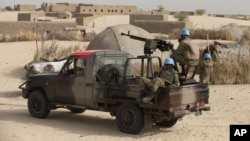The U.N. will send more troops and continued support against terrorists in Mali it announced this week, on the one-year anniversary of the U.N.'s intervention in the West African country.
"On the occasion of the first anniversary of the Agreement on Peace and Reconciliation in Mali, the Secretary-General welcomes the renewed commitment to peace expressed by the President of Mali, Ibrahim Boubakar Keïta, and his Government," Secretary General Ban Ki-Moon said in a statement released Monday. "The Secretary-General trusts that the signatory parties will ensure the swift and full implementation of the agreement, bearing in mind the many challenges that lie ahead. He encourages them to remain steadfast in their efforts."
Last week Mali Prime Minister Modibo Keita addressed the U.N. Security Council in New York, particularly noting that the U.N. would send 2,500 troops in addition to the 12,000 already on the ground.
But he warned that the solution to violence in Mali is not entirely in numbers.
"The solution... is not in quantity but in quality," Keita told VOA Afrique. He recounted recommendations made to the Security Council, including "to strengthen the operational capacity of MINUSMA (United Nations Multidimensional Integrated Stabilization Mission in Mali) by giving it adequate resources, appropriate means to deal with the advance of terrorism."
The prime minister stated that this does not mean that Mali is incapable of fighting jihadists, but, on the contrary, shows their commitment to fighting terrorist forces in Africa. His second recommendation to the U.N. was to train Malian forces themselves.
MINUSMA was established by the U.N. in 2013 to stabilize the country after the Tuareg rebellion in 2012. The base has seen 66 deaths since it's establishment, making it the most dangerous U.N. deployment in the world.
Violence, particularly in the North of the country where some rebel groups are based, has fluctuated since the rebellion. Nineteen people were killed in the Radisson Blu hotel in Bamako last November, an attack claimed by a branch of terror group al-Qaida. But the prime minister says the threat of terrorism in Mali is a universal threat.
"If terrorism has a future in Mali, that means it has a future in the world," Keita said. "Which country isn't concerned about an attack today? Thousands of kilometers from Mali attacks are carried out every day - whether they are in Africa, in Europe, or in the U.S."
Mali has been battling multiple militant groups in recent years, including al-Qaida in the Islamic Maghreb (AQIM), with roots in Algeria, and the homegrown Ansar Dine - a group lead by prominent Tuareg leader Iyad Ag Ghaly. Both groups aim to spread Islamic law in Mali.
Keita says that Mali will not engage in any dialogue with Ghaly.
"We can't associate with anyone supporting terrorism," he said.




